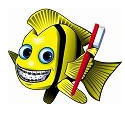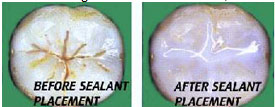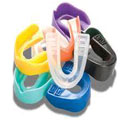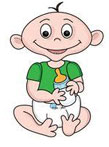Kids Dentistry
Preventive Dentistry?
Preventive dentistry means a “healthy smile” for your child, and it begins with your child’s first tooth. Make sure to schedule your child’s first visit by his/her 1st birthday. After evaluating your child’s dental health, the Dr. will design a personalized program of home care for your child. This program would include all or several of the preventive services. By following the designed program, you can help giving your child a lifetime of healthy habits.
Oral hygiene instructions
Preventive dentistry starts with instructing patients and/or parents the proper brushing and flossing techniques. We provide and reinforce oral hygiene instructions at every recall visit.

Tooth Cleaning and polishing
Tooth cleaning or polishing treatment is a part of your child’s preventive program. We use a special paste to polish teeth and remove any plaque build-up. Some children’s teeth may require to be scaled if tartar build-up is present. Tooth cleaning or polishing is recommended twice a year followed by a Fluoride treatment. Children with braces or special needs may require more frequent cleanings as recommended by the doctor.

Fluoride
It has been scientifically proven that excess amounts of fluoride intake will cause discoloration of permanent teeth, and insufficient fluoride would promote weak enamel. Weak enamel is more susceptible to caries. In order to assure that our young children are getting just the right amount of fluoride, we provide fluoride intake analysis in our office.

Diet Counselling
It is normally recommended for children to have a balanced diet that would include major food groups for a healthy growth and development. Teeth are equally affected by the diet. A balanced diet would help teeth to grow properly. In fact, a diet full of carbohydrates, (sugars and sticky starches) would place your child at a risk of having cavities. At the initial examination visit and subsequent recall visits, we evaluate your child’s diet and make recommendations to help your child’s teeth stay healthy.

Oral Habits
Some Children suffer from oral habits such as thumb/digit sucking or tongue thrusting. These habits can be very normal for infants and younger children. Prolonged oral habits can cause dental deformities such as bite problems. The doctor would evaluate your child with prolonged oral habits. Proper recommendations will be made. These recommendations may consist of behavior management techniques and/or simple habit appliances for older children.

Orthodontics
Young children may suffer from orthodontic problems such as cross-bites, crowding of teeth in the jaw, congenitally missing teeth, extra teeth, and so on. Some of these orthodontic problems need to be addressed at a young age when the child still has some baby teeth as well as some permanent teeth. This is called Phase I orthodontic treatment. In some cases, if the child responds well to Phase I, extensive orthodontic treatment can totally be prevented. If major orthodontic problems are not detected or the child patient has high caries risk, Orthodontic treatment can be postponed till all permanent teeth are present. At our office, dental growth and development is checked and recorded at every recall visit. Proper recommendations and/or orthodontic referrals are made by the doctor after this thorough assessment of dental health and growth of your child.

Sealants
Dental sealant is a thin, plastic coating painted on the chewing surfaces of teeth -- usually the back teeth (the premolars and molars) -- to prevent tooth decay. The sealant quickly bonds into the depressions and grooves of the teeth, forming a protective shield over the enamel of each tooth.

Sports Safety
It is extremely important for children and adults to wear a mouthpiece or a mouth guard when involved in any kind of sports activity. Wearing a mouth piece can not only protect the teeth, it can also help reduce any damage on the jaw joints (TMJ) and concussions. A dental trauma can range from soft tissue bruises to tooth fractures, avulsed teeth, Jaw fracture and so on. Mouth pieces can be purchased from sport stores or custom made by the dentist office.

Calming The Anxious Child
Our first visits start with getting acquainted. Child friendly names for the instruments are used. With younger and more anxious children, we try to make the first visit very happy and short. We also believe that children should be praised and rewarded with small toys and stickers for their cooperation and good behavior. This in turn would help the children to be more willing to cooperate for future visits.
We highly encourage parents to stay with their child during his/her dental treatment to help him/her to feel more secure. To alleviate potential anxiety, we request that parents do not discuss the details of the dental treatment with their children. The Dr. and staff explain procedures in a child friendly manner. This Doctor-child communication can often be enhanced if other siblings can stay in the waiting room during procedures.
Occasionally, a young child’s behavior during treatment requires assertive management. An example would be voice control, speaking calmly but firmly. Some children require other modalities such as sedation in order to receive the needed dental treatment. If such modalities are needed to be used, the Dr. and staff would review the detailed information with you in advance.

Dental Care for Special Child
Dentist at our clinic has advanced training to manage patients with special needs. Our office is also specially designed to be physically accessible for special patients. Special children have special dental needs. Some special children are more susceptible to gum disease, cavities or dental trauma. Most of these dental problems are highly preventable. We recommend that you start your child’s first dental visit by his/her first birthday. The doctor would recommend routine preventive visits or needed dental treatment after a thorough examination.

Dental Care for Your Baby
Dental problems can begin at a very young age. The earlier the dental visits, the better the chance of preventing these dental problems. It is generally recommended by American Academy of Pediatric Dentistry and American Academy of Pediatrics to have your child visit the dentist within 6-12 months of the eruption of the first tooth. A big concern in this age group is “Early Childhood Caries”. This is also known as “baby bottle tooth decay” or “nursing caries”. This caries process is due to using bottles at nap time or unhealthy nursing practices. Often times these young children suffer from tooth infections, early loss of baby teeth, and transient speech and aesthetic problems. The most important issue is to have a young child having to go through the dental treatment that would have been otherwise prevented. To prevent early childhood caries, the following is recommended: Wean your baby from the bottle by 12-14 months of age, don’t send your child to bed with a bottle containing sugar (milk, juice, sweet tea, and so on), encourage your child to drink from a cup by age one, start wiping or brushing your child’s teeth as they come in, schedule to see a pediatric dentist as recommended above.

Kiddie or Pedo Partial
For the very young who experience loosing a front tooth or several front teeth due to decay or trauma, we do provide a fixed appliance that is called Kiddie/Pedo partial. This appliance is fixed (glued on the molar teeth) and is an elective procedure based strongly on parental desires and for cosmetic reasons only.

Pulpectomy
When the nerve of a baby tooth becomes infected, a pulpectomy can save the tooth. Like a root canal in an adult tooth, a pulpectomy involves removal of the infected nerve and the placement of a filling material.
Four steps to a pulpectomy
Though treatment is individualized in each case, there are four common steps in a pulpectomy. First, an opening is made into the tooth to get at the infection. Then the infected nerve tissue is removed. A filling material is placed in the root canals, and then a crown is placed to seal and protect the tooth.
The procedure
We want the entire procedure to be comfortable for your child, so the first thing we do is make sure her mouth is thoroughly numb. We place a rubber dam around the tooth to isolate it from the rest of the mouth. It protects her like a safety net: Nothing can fall to the back of her throat.
To get at the infection, we make an opening through the top of the tooth down into the pulp chamber. We carefully clean out the infected tissue and then place a filling material. The last step in the procedure is the placement of a crown to seal and protect the tooth.
Pulpotomy
In primary teeth, when deep cavities have reached the nerve, or close to the nerve, it's sometimes necessary to perform a pulpotomy.
A pulpotomy is the removal of the irritated part of the nerve, also called the pulp, while leaving the healthy root canals intact. This procedure is relatively quick and painless, and it's extremely effective in eliminating infection in the nerve and saving your child's tooth.
The procedure
We want the entire procedure to be comfortable for your child, so the first thing we do is make sure the area is thoroughly numb.
Next, we place a rubber dam around the tooth to isolate it from the rest of the mouth and to keep it dry. It protects like a safety net. Nothing can fall to the back of the throat. To get at the irritated tissue, we make an opening through the top of the tooth down into the pulp chamber. We then carefully clean out the irritated nerve tissue from the top of the tooth and medicate the remaining pulp to speed healing.
The last step in the procedure is to place a crown on the tooth to seal and protect it.
Discomfort after the procedure is unlikely, but if your child does experience some pain, you can give a children's pain reliever, following the instructions on the label.
Space Maintainers
Why are baby teeth important? Normally, as a permanent tooth comes in under a baby tooth, the roots of the baby tooth dissolve away and the permanent tooth replaces the baby tooth. In addition to being important for chewing, the baby tooth holds the adjacent teeth in place. When a baby tooth is lost early, due to decay or injury, the adjacent teeth may drift together causing loss of space in the dental arch.
Placing a space maintainer
When a baby tooth is lost early, this shifting and loss of arch space can be prevented by placing a space maintainer. It generally takes two appointments to complete a space maintainer. During the first appointment, an orthodontic band is carefully placed and an impression is taken. A model of the child's mouth is made from this impression so that the dental laboratory can form the space maintainer to the exact contours of the mouth. During the next appointment, the space maintainer is tried in, adjusted if necessary, and then cemented in place.
Caring for the space maintainer
Space maintainers are used until the permanent teeth begin to break through the gums. While wearing a space maintainer, it is important to avoid chewing gum, sticky candies, and hard foods like Cornnuts or ice. Following up with periodic checks of the space maintainer here in our office will make sure it's still functioning properly and keeping all the teeth in their proper position.

Get In Touch
-
32 Diamonds Dental Clinic
-

11/4, 1st Floor, Rameshwer Tower,
Above Khanna Opticals ,Main Market,Vaishali, Sector-4, Ghaziabad-201010 (U.P.)
-

Mor.: 10.00 am to 1.30 pm
Eve.: 5.30 pm to 8.30 pm
(Tuesday Closed)
